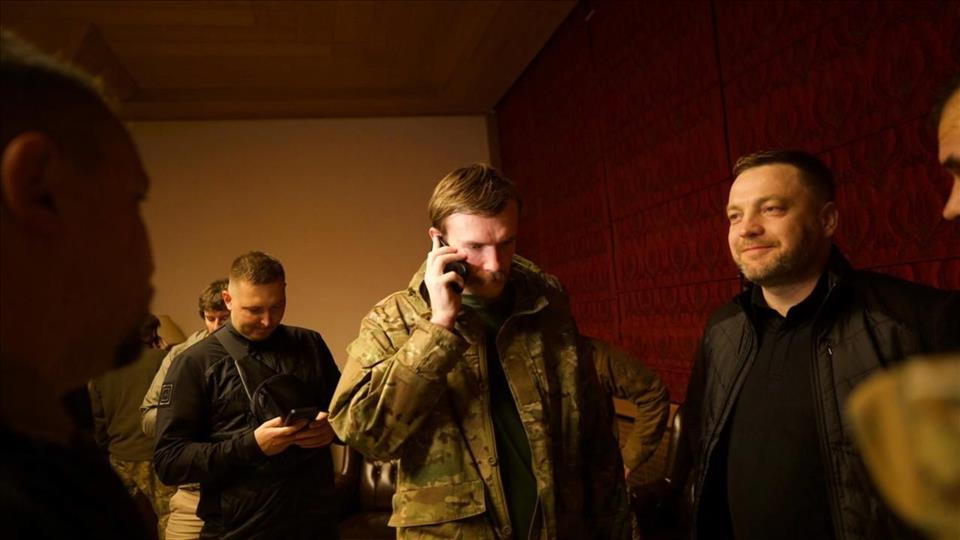(MENAFN- Swissinfo)
Français
(fr)
Pусский
(ru)
“I've been going through hell. This is pain and desperation that won't leave you and will stay with you the whole day,” the mother of a detained Ukrainian soldier told journalists at a press conference in Geneva on Thursday. She has not heard from her son since he left the Azovstal steel plant in Mariupol and was captured by Russian forces five months ago.
The delegation consisted of four women – two mothers, a wife, and a daughter of Ukrainian POWs – who did not wish to be identified for security reasons. The purpose of their visit in Geneva was to meet with officials at the UN Human Rights Office (OHCHR) and the International Committee of the Red Cross (ICRC) to“let them know about their stories and to call them to action,” said Hanna Zamazieieva, head of the Mykolaiv regional council, who was travelling with the delegation.
The visit highlighted the frustration among some groups in Ukraine over what the humanitarian community in Geneva is realistically able to do about the treatment of POWs held by the Russian army.
“We want people to understand our pain and we want people to also help us and assist us in this situation,” said the spouse of a captured Ukrainian soldier. For the past seven months, she has had no news from her husband.“I don't know where he's held, I don't know in what conditions he's held, I don't know his state. I'm very concerned about the winter coming, and the cold, and the fact that he will not have access to warm clothes nor shoes,” she added.
ExpectationsThe group took several proposals and requests to Geneva's international organisations. They hoped to discuss the transfer of Ukrainian POWs to a third country, the release of captive non-combatants, the establishment of a mechanism of communication with detainees, and the delivery of medical and other humanitarian supplies to imprisoned soldiers.
Zamazieieva plans to urge the ICRC to visit all Ukrainian POWs, in Russian-occupied territories as well as in the Russian Federation, and to press the organisation to negotiate access to them with greater urgency. In particular, she wished to see the requests the ICRC had sent to Russian authorities.
“We have no access to information about the number of letters that were sent, how many requests were sent and denied. So we would first like to know that,” said Zamazieieva.“As soon as we know what actions have already been taken, we can think commonly and work on the next steps,” she added.
The ICRC has recently been criticised by Ukrainian President Volodymyr Zelensky, who accused the organisation of“inaction” in defending the rights of Ukrainian POWs. Two weeks ago, Kyiv sent an ultimatum to the ICRC to carry out a mission to a prison near Olenivka, in the Russian-occupied east of the country, where dozens of Ukrainian prisoners died following an explosion in July.
RealityIn response, the ICRC issued a statement explaining that a team had been ready for months to check on prisoners in the region, but that it could not force a visit without the authorisation of local authorities and obtaining minimal security guarantees. ICRC staff are not armed and do not travel with armed security. The organisation pointed out that despite“nearly eight months of persistent demands” its teams had not been offered unimpeded and repeated access to all POWs.
Under the Geneva Conventions, countries have an obligation to allow the ICRC to access POWs, so that it can check on the conditions and treatment of detainees, bring them essential supplies, and keep their families informed. It is also up to states to ensure that POWs are treated humanely.
“We share the frustration that we have not yet had access to all POWs. We know that behind it lies the anguish of families not knowing about the well-being of their loved ones,” the ICRC wrote in a statement ahead of Thursday's meeting with the Ukrainian delegation.
It is not the first time since the start of the war in Ukraine that the ICRC has come under pressure. Back in March, misinformation and disinformation about its action spread online and prompted the organisation to explain what it does. Pictures of then ICRC president Peter Maurer smiling next to Russia's foreign minister Sergei Lavrov, had caused outrage on social media.
The ICRC was heavily criticised on Ukrainian social media for still talking to Russia following its aggression of Ukraine. But it is precisely the ICRC's neutrality and impartiality that allows it to assist victims of war. On Thursday, the ICRC reiterated:“We will never stop demanding access to all prisoners of war held in the international armed conflict between Russia and Ukraine until we can see them repeatedly, wherever they are held.”
Edited by Imogen Foulkes




















Comments
No comment